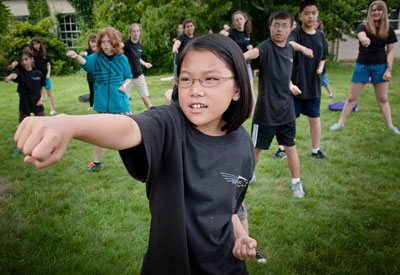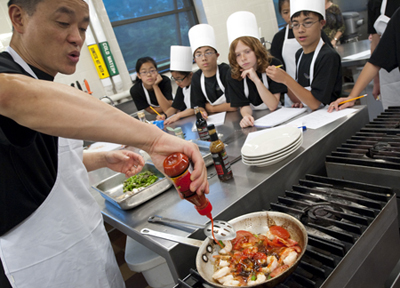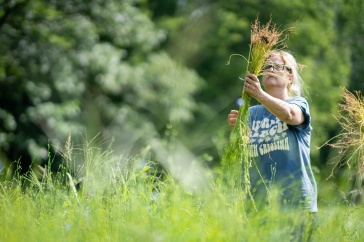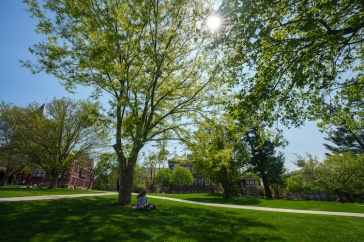
Jesse Kelley-Derzon, 13, prepares Chinese broiled salmon under the watchful eye of UNH Thompson School chef Julienne Guyette.
On June 20, less than a week after finishing her sixth grade school year, 12-year-old Mia Roman traveled from Pennsylvania to New Hampshire to participate in an intensive two-week class in Chinese at UNH. Through July 3, while her friends at home in Bethlehem are sleeping late and watching TV, Roman and some 30 other 10- to 17-year-olds are starting their day with half an hour of martial arts before immersing themselves in the notoriously challenging Mandarin language and learning how to cook traditional Chinese dishes not found on your local take-out menu, all part of the University’s “Startalk” Chinese language and culture immersion program. And it’s not that they don’t know what they’re getting into—fully half of this year’s Startalk program participants, Roman included, are returning students from previous years.
“I had such a great time here last year and made so many good friends,” says Roman. “I couldn’t wait to come back and do it again!”
A part of the U.S.-wide National Security Language Initiative to increase Americans’ knowledge of so-called “critical need” foreign languages, the Startalk summer program is now in its third year at UNH. Yige Wang, who has served as lead instructor for the UNH program since its 2010 inception, says the camp, one of just over 100 offered nationwide, is an extraordinary opportunity for students to establish a foundation of Chinese.

Eleven-year-old TingTing McGovern and her Startalk classmates get their day going with half an hour of martial arts on the lawn in front of Barton Hall.
“Mandarin is a difficult language, and if you wait too late to start it can be very intimidating,” he says. “This program gives students the chance to become comfortable with the language early on, and we pair the instruction with lots of games and activities to make it fun.”
With a focus on cooking, this year’s program is not only fun but delicious. After a morning of classroom instruction, students spend from 11 a.m. to noon each day in the kitchen at the Thompson School of Applied Science creating healthy Chinese dishes like shrimp with asparagus and beef with broccoli. After watching Wang run through a quick demonstration, students in small groups follow step-by-step instructions—in Chinese— to prepare the day’s dish. The measure of the students’ success in following the instructions is an infinitely practical one; the meals they make are the day’s lunch. A missed step can mean a failed dish, and a hungry afternoon.
Wang says the Startalk team decided to build this year’s program around the theme of healthy cooking for several reasons. For one, he says, pairing the language instruction with a hands-on activity is an effective way for students to build and retain vocabulary— and learn all-important phrases like “be careful—that knife is sharp!”

Lead instructor Yige Wang takes 2012 Startalk summer program participants through the steps for cooking a healthy dish of shrimp and asparagus, providing all instructions in Chinese.
For another, Wang hopes to reshape students’ thinking about Chinese food. “There’s a real misconception in the U.S. about Chinese cuisine,” he explains. “Real Chinese cooking is about much more than egg rolls and fried rice. Introducing some authentic, protein and vegetable-based dishes gives the students another window into Chinese culture. It also helps them eat more healthfully!”
Thirteen-year-old Jesse Kelley-Derzon of Greenland, N.H., is another Startalk returnee. She says this year’s cooking focus makes a great experience even better.
“One of the things I like about the time we spend in the kitchen is that you almost forget that you’re learning while you’re cooking,” she says. “And the things we’ve made are really good!”
Wang hopes camp participants will take what they’ve learned and continue to use it at home—New Hampshire, Maine, or Massachusetts in most students’ case, though there is Roman, from Pennsylvania, and 14-year-old Taquin Krug from Utah. “It’s pretty exciting to us to have students coming from so far away,” he says. “Of all the Startalk programs running this summer, I think we’re the only one offering the cooking focus, and that’s attracted some special interest.”
As the two-week camp winds down, the campers are looking ahead to the closing ceremony. Next Tuesday night, they will put on a Chinese banquet for their families, applying the skills they’ve learned to everything from designing and writing the menus to cooking and serving the meal. Wang is also looking ahead to 2013, when the University will again apply for a National Foreign Language Center grant, generous external funding that has made the program possible since 2010.
The University’s chances seem good—the program received high marks from a national Startalk evaluation team that visited on Monday to observe Wang and the students at work. The team particularly praised the hands-on, content-focused teaching, just one of many indicators that Startalk-UNH is achieving the greater program’s mission of introducing important foreign languages to a broader, younger audience.
A number of this session’s campers have attended all three years, and many have built on their Startalk foundation with Chinese lessons elsewhere. At least one former student, Abi Ferguson ’15, has taken her Startalk experience and turned into a bigger commitment to Chinese: the rising sophomore from Concord, N.H., recently returned from a three-week summer study abroad program at the University’s Confucius Institute “sister school” in China, Chengdu University, where she took many of her Startalk experiences to the next level (view a slideshow of the 2012 Chengdu trip here).
Says Wang, “We hope Abi is just the first of many students who continue that connection between Startalk and UNH.”
-
Written By:
Kristin Waterfield Duisberg | Communications and Public Affairs

















































